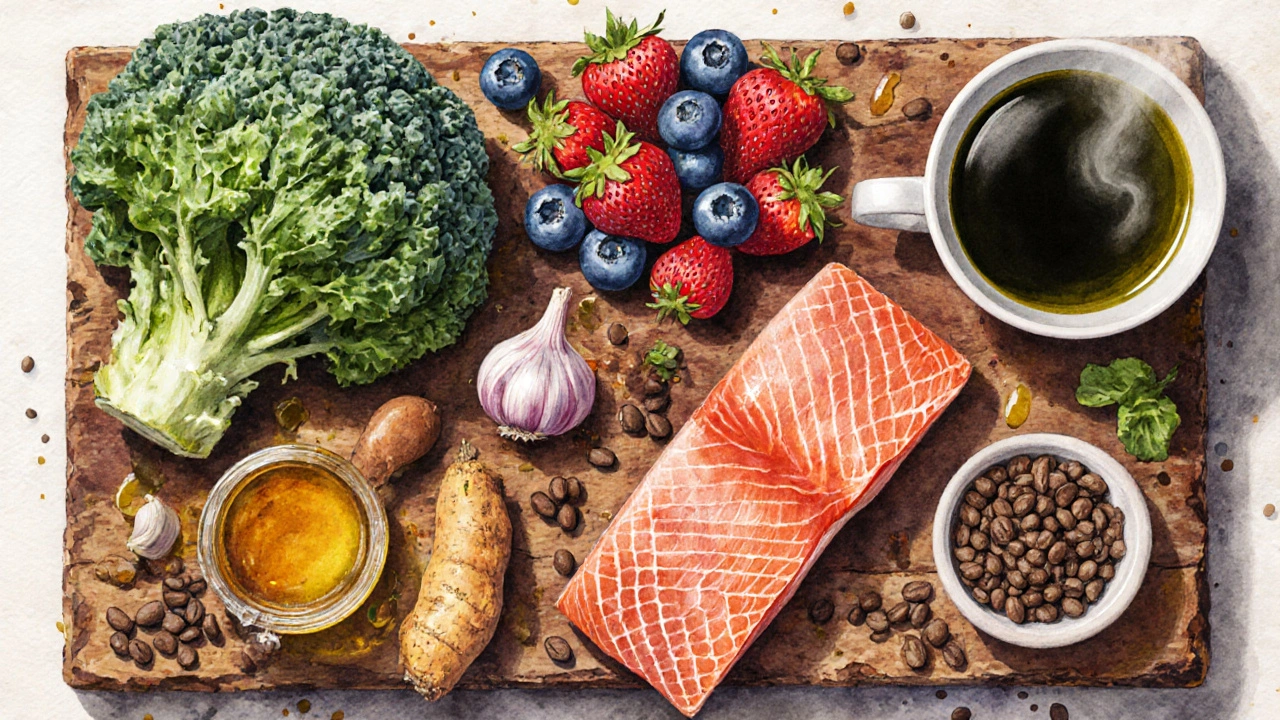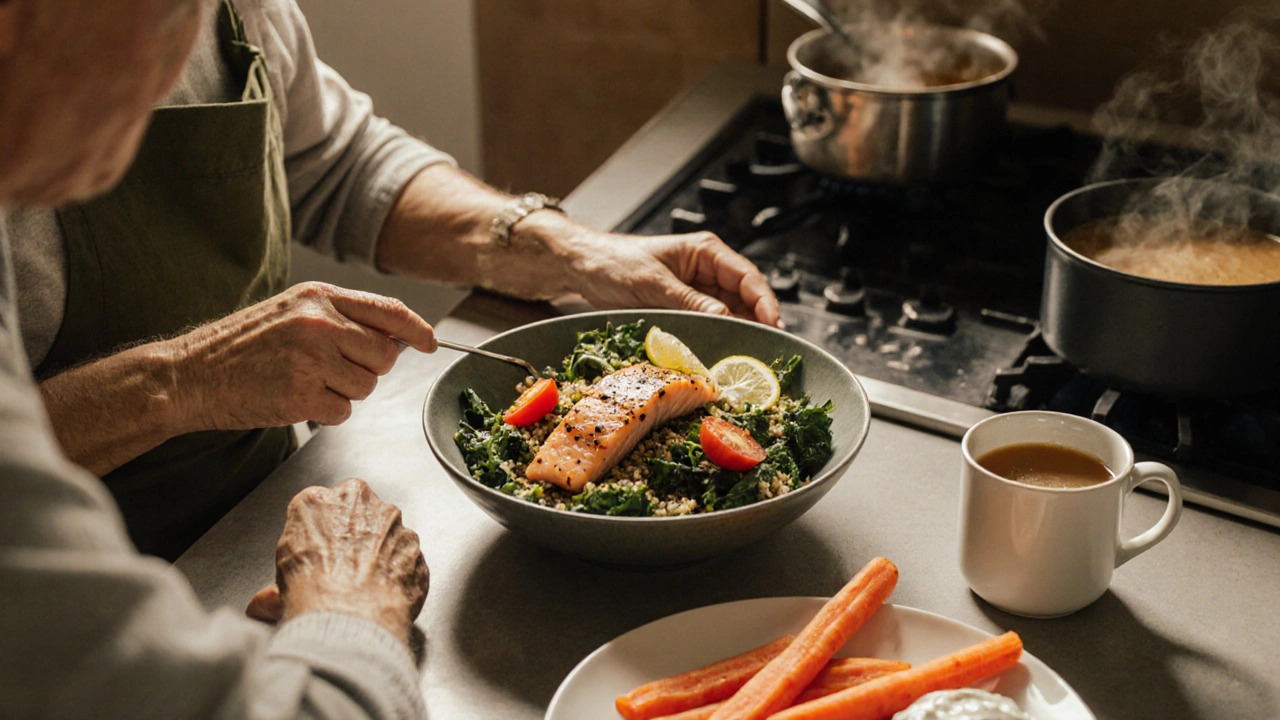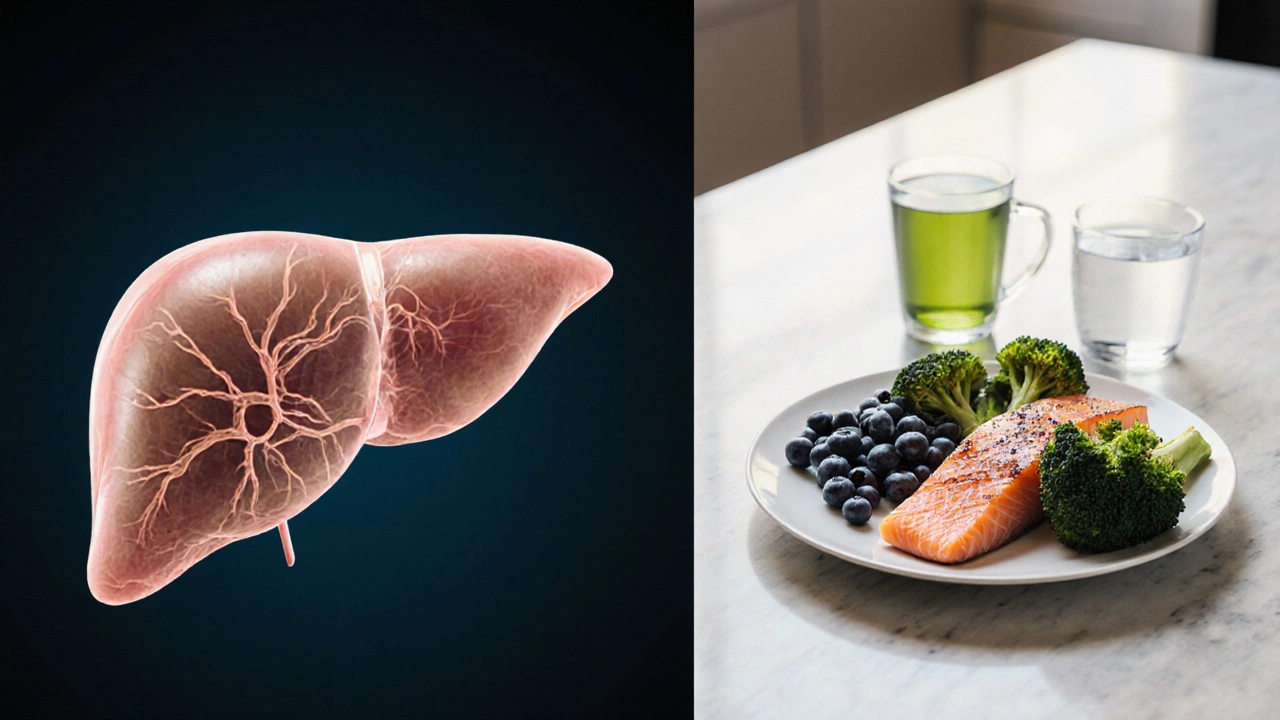Liver Cancer Diet Food Checker
Enter any food item to see if it's recommended for liver cancer patients according to medical guidelines.
When a liver cancer diagnosis lands on your doorstep, the first thing most people ask is, “Can what I eat make a difference?” The short answer is yes. The right foods can help keep the liver functioning longer, reduce treatment side‑effects, and even support the body’s own defenses. Below is a practical guide that shows which foods to put on your plate and which to keep off it, all backed by the latest nutritional science.
Understanding the link between nutrition and liver cancer
Liver Cancer is a malignant growth that starts in the liver’s cells. It often develops in the context of chronic liver disease, such as hepatitis B or C, cirrhosis, or heavy alcohol use. While genetics and viral infections play a big role, diet influences the liver’s ability to repair itself, manage inflammation, and fight tumor growth.
The liver is the body’s detox hub. It processes nutrients, filters toxins, and produces proteins essential for blood clotting. When you overload it with harmful substances, the organ’s capacity to counteract cancer‑related damage drops sharply.
Core dietary principles for liver cancer patients
Think of these as the building blocks of a liver cancer diet:
- Stay hydrated - Aim for at least 2‑3liters of water daily unless your doctor advises fluid restriction.
- Control portions - Smaller, frequent meals are easier on the liver and help maintain steady blood sugar.
- Prioritise plant‑based foods - Vegetables, fruits, whole grains, and legumes deliver antioxidants and fiber.
- Include high‑quality protein - Lean poultry, fish, tofu, and low‑fat dairy supply the amino acids needed for tissue repair.
- Limit saturated fat and added sugar - Both increase liver fat accumulation, which accelerates disease progression.
Foods to load up on
Here’s a quick run‑through of the best allies for the liver:
| Food | Key Nutrient(s) | Why it Helps |
|---|---|---|
| Cruciferous vegetables (broccoli, cauliflower, kale) | Sulforaphane, fiber | Boosts detox enzymes, reduces oxidative stress |
| Berries (blueberries, strawberries) | Anthocyanins, vitamin C | Powerful antioxidants that protect liver cells |
| Fatty fish (salmon, mackerel) | Omega‑3 fatty acids | Anti‑inflammatory, may slow tumor growth |
| Green tea | Epigallocatechin‑3‑galate (EGCG) | Inhibits cancer cell proliferation in lab studies |
| Garlic | Allicin | Enhances immune response and may trigger cancer cell apoptosis |
| Turmeric | Curcumin | Reduces inflammation and supports liver regeneration |
| Coffee (plain, no sugar) | Chlorogenic acid | Linked to lower liver cancer risk in large cohort studies |
| Legumes (lentils, chickpeas) | Plant protein, fiber | Provides protein without excess saturated fat |
These foods all share two common traits: they are rich in antioxidants or anti‑inflammatory compounds, and they supply the liver with nutrients that aid detoxification.

Foods to steer clear of
Not everything tastes great, but some items can literally sabotage your liver’s fight against cancer:
| Food | Problematic Component | Potential Harm |
|---|---|---|
| Alcohol | Ethanol | Accelerates cirrhosis and interferes with chemotherapy |
| Processed meats (bacon, sausages) | Nitrates, saturated fat | Promotes oxidative stress and inflammation |
| Fried foods | Trans fats, acrylamide | Increase liver fat and damage cell membranes |
| Sugary drinks (sodas, sweetened teas) | High fructose | Leads to fatty liver disease and insulin resistance |
| White bread & refined carbs | Low fiber, high glycemic index | Spikes blood sugar, worsening liver stress |
| High‑salt snacks (chips, salted nuts) | Excess sodium | Raises blood pressure, contributing to portal hypertension |
| Red meat (large portions) | Heme iron, saturated fat | May increase production of carcinogenic N‑nitroso compounds |
While occasional indulgence isn’t a death sentence, make these items rare guests at your table, especially during active treatment phases.
How to build a liver‑friendly meal plan
Putting theory into practice can feel overwhelming, so here’s a simple template you can copy‑paste into your weekly routine:
- Breakfast: A bowl of oatmeal topped with fresh berries, a sprinkle of chia seeds, and a cup of green tea.
- Mid‑morning snack: A small handful of unsalted almonds and an apple.
- Lunch: Quinoa salad with kale, cherry tomatoes, grilled salmon, and a drizzle of lemon‑olive oil.
- Afternoon snack: Carrot sticks with a garlic‑yogurt dip.
- Dinner: Stir‑fried broccoli, bell peppers, and tofu in a low‑sodium soy sauce, served with brown rice.
- Evening wind‑down: A cup of plain coffee (if tolerated) or warm turmeric‑milk.
Adjust portion sizes based on your energy needs and any dietary restrictions your doctor has given you.
Special considerations during treatment
Chemotherapy uses powerful drugs to kill fast‑growing cancer cells, often affecting appetite and digestion. When you’re on chemo or immunotherapy, keep these tips in mind:
- Manage nausea with ginger tea or bland soups.
- Boost protein by adding a scoop of whey or pea protein to smoothies.
- Watch electrolytes - low‑sodium broth can prevent dehydration without excess salt.
- Limit raw foods if your white blood cell count is low, to reduce infection risk.
Always coordinate with your oncology dietitian; they can fine‑tune macro‑nutrient ratios based on lab results.

Monitoring progress: the role of biomarkers
Doctors often track AFP (Alpha‑fetoprotein) a blood protein that can rise with liver cancer activity.. While diet alone won’t normalize AFP, a nutrient‑dense regimen can improve overall liver health, potentially stabilising the marker. Pair dietary changes with regular blood work to see how your body responds.
Common myths busted
Myth 1: “If I eat only raw vegetables, the cancer will disappear.”
Reality: Raw greens are great, but the liver also needs cooked foods for better nutrient absorption and to avoid bacterial contamination.
Myth 2: “All fats are bad.”
Reality: Healthy fats from fish, avocado, and nuts provide essential fatty acids that support cell membranes and reduce inflammation.
Myth 3: “Supplements can replace food.”
Reality: Supplements may fill gaps, but they can’t replicate the complex matrix of nutrients found in whole foods.
Quick reference checklist
- Drink 2‑3L water daily.
- Include at least one cruciferous veg, one berry, and one oily fish each day.
- Swap coffee with sugar‑free, plain brew; limit to 2‑3 cups.
- Eliminate alcohol, processed meat, and sugary drinks.
- Monitor portion sizes and eat every 3‑4hours.
Frequently Asked Questions
Can a specific diet cure liver cancer?
Diet alone cannot cure liver cancer, but it can improve liver function, reduce treatment side‑effects, and support overall health. Combining a balanced diet with medical treatment offers the best chance for a better outcome.
Is coffee really good for liver cancer patients?
Large cohort studies have shown that moderate coffee intake (2‑3 cups daily) is linked to lower liver cancer risk and may slow disease progression. It should be plain, without added sugar or high‑fat cream.
Should I avoid all fats?
No. Saturated and trans fats should be limited, but omega‑3 rich fats from fish, flaxseed, and walnuts are beneficial. They help reduce inflammation and support cell health.
How much protein do I need during chemotherapy?
Patients typically aim for 1.2-1.5g of protein per kilogram of body weight daily, spread across meals. This helps preserve muscle mass and supports healing.
Can I still eat out at restaurants?
Yes, if you choose wisely. Opt for grilled fish or chicken, steamed vegetables, and request sauces on the side. Avoid fried dishes, heavy cream sauces, and any alcohol‑based marinades.

